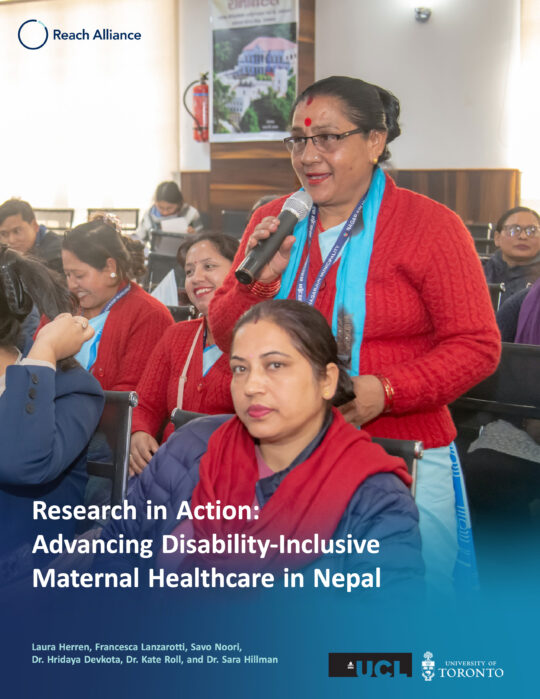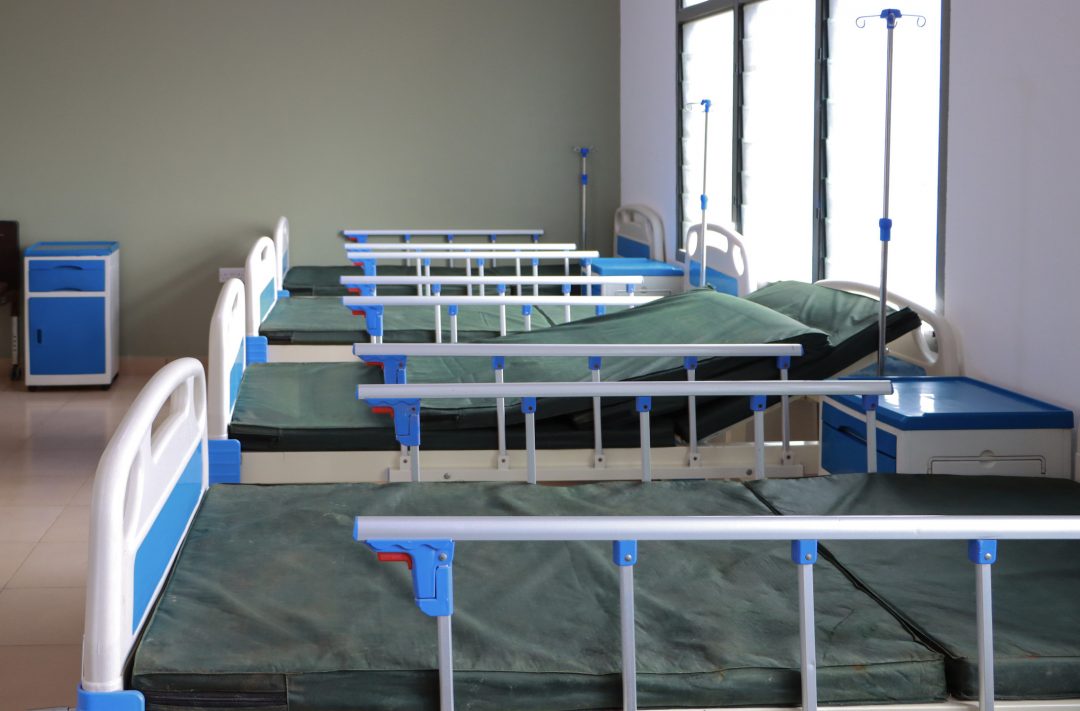Executive Summary
The global shortage of hospital beds, particularly in developing regions, poses a significant challenge to public health. Over 80 countries, including Ghana, fall below the World Health Organization’s recommended minimum of five hospital beds per 1,000 people. In 2019, the African region reported the lowest hospital bed per capita average at 1.3 beds per 1,000 people, well below the global average of 2.7 beds.
This bed shortage, dubbed the “No Bed Syndrome” in Ghana, remains a critical issue for healthcare delivery. It is characterized by a hospital-bed-to-1,000-people ratio of 0.9 in 2021. This shortage impedes patient access to quality healthcare, leading to hospital overcrowding, heightened health risks, and even fatalities.
In addressing this phenomenon, we examined the Ghanaian healthcare system, investigated the causes and effects of the bed shortage, and explored existing interventions to mitigate the issue in tertiary hospitals. The study adopted a sequential mixed method approach, which consisted of conducting key informant interviews with healthcare workers followed by quantifying the insights gathered from the interviewees.
The study revealed four significant insights:
- The concept of “bed capacity” involves not just the availability of beds but also the availability of resources, including healthcare professionals, to make those beds functional.
- The hierarchical structure of Ghana’s healthcare system promotes decentralization but the inadequate distribution of resources across lower-level facilities causes the public to disregard the ideal structure and go directly to tertiary hospitals.
- The No Bed Syndrome is driven by a complex interplay of resource-related factors, system-related issues, and patient-related dynamics that lead to patient losses and emotional distress for both patients and healthcare professionals, among other effects.
- The strategies to mitigate the phenomenon vary among tertiary hospitals and within departments. Among these, increasing the number of beds and establishing a “Bed Bureau Office” stand out for their efficiency.
A systemic approach is needed to further unpack this issue and identify the various levers of change to develop interventions. We recommend strengthening collaborations with the Ministry of Finance and the Ministry of Gender, Children, and Social Protection. Both the public and healthcare workers need education on the healthcare system’s structure while lower-level facilities need equipment and personnel. While investing in hospital bed maintenance and ward space expansion, the country should also establish a referral system leveraging the existing role of the Bed Bureau Unit.
The No Bed Syndrome: A Global and Local Challenge
Around the world, the scarcity of hospital beds is a persistent health issue. The World Bank estimates that across over 80 countries, 60 per cent of them possess fewer than five hospital beds per 1,000 people — a number set as the minimum requirement by the World Health Organization (WHO). In developing regions, the shortage of hospital resources is particularly serious. In 2019, the WHO reported that the African region had the lowest number of hospital beds per capita, with an average of just 1.3 beds per 1,000 people, far below the global average of 2.7 beds.1
This alarming scarcity underscores the urgency to address the deficiency of beds in Ghana and other African countries. The Ghanaian healthcare system, like many others, is confronted by various challenges, including inadequate funding and substandard quality of care. However, the shortage of beds remains one of the most pressing and systemic issues that impede patients’ access to healthcare. With a hospital-bed-to-1,000-people ratio of just 0.9 in 2021, the No Bed Syndrome affects the entire population and has led to situations like hospital overcrowding, which exposes patients to heightened health risks and even death.
Especially in the country’s major hospitals, the lack of hospital beds has been a long-standing issue. In 2015, The Ghana Health Service estimated the number of hospital beds at 19,907 with a turnover per bed of 99.7 per cent and the average length of stay at 3.3 days in 2014.2 This means that, on average, available hospital beds are occupied almost all the time, with patients frequently filling them for about three days before being discharged or transferred to another facility. Dubbed the “No Bed Syndrome” by Ghanaians, the lack of hospital beds publicly escalated in 2018 following a tragic incident. A 70-year-old man, Anthony Opoku-Acheampong, died after failing to secure admission in seven hospitals in Accra: two private healthcare providers, and five state-owned facilities including two tertiary hospitals (Korle-Bu Teaching Hospital and Greater Accra Regional Hospital). The term first described “the lack of beds in hospitals for new patients, especially in emergency departments.”3 While the phrase has been used in different ways since then, for us, the “No Bed Syndrome” refers to the lack of beds in Ghanaian tertiary hospitals. This extends beyond emergency departments and affects all departments in such hospitals and all types of hospital beds.
Our research makes a significant contribution to existing knowledge gaps in this field, where the available databases are sparse, limited documentation exists on the issue, and the scant literature available predominantly relies on secondary data sources. With a keen desire to learn from the experiences of both Ghana and other countries, we sought to understand the structure of the Ghanaian healthcare system and its role in shaping the phenomenon, investigate the causes and effects of the shortage of hospital beds in Ghanaian tertiary hospitals, and explore the various interventions that have been implemented to mitigate the phenomenon.
We also aim to contribute toward achieving target 3.D of the United Nations’ Sustainable Development Goal 3 (Good Health and Well- being), which aims to strengthen the capacity of all countries, in particular developing countries, for early warning, risk reduction, and management of national and global health risks. The study also aligns with goals 1 (High Standard of Living, Quality of Life and Well-being for All) and 3 (Healthy and Well-nourished citizens) of the African Union’s Agenda 2063.
Navigating Ghana’s Healthcare System
The Ghanaian healthcare system is made up of public and private providers, along with quasi-government institutions (institutions with both public and private characteristics funded by the government), and traditional medicine providers (see Figure 1). The private sector is vital to the system. Although it constitutes one-third of all health facilities in the country, it provides basic curative health services and very few preventive services at relatively high costs in mostly urban areas.4
The structure of the healthcare system is hierarchical. We examine it from two intertwining perspectives: the referral system and local administrative governance. The system follows a referral approach to provide appropriate care at different levels from the bottom to the top: the primary, secondary, and tertiary levels. The referral system requires patients to first access primary care once they make the initial decision to seek medical care (their decision point), which then refers them to a higher level when the need arises. To ensure a decentralized healthcare network within the referral system, the system is categorized according to the administration in terms of local governance: community, subdistrict, district, regional, and national levels (see Figure 2). Most private facilities operate at primary and secondary levels while the public sector facilities provide services at all levels.
The services delivered at each level vary leading to the category of facilities based on the type of services delivered. The primary care level, which is managed on the subdistrict or community levels, consists of community-based health planning and services (CHPS), health posts, health centres, polyclinics, and clinics, including maternity homes.
Figure 1. Main sectors of Ghanaian healthcare.
These are staffed mainly by community health nurses trained in emergency obstetric care. Then there are district hospitals, which are part of the secondary care level and are managed at the district level. The tertiary care level is made up of regional and teaching hospitals that are managed at the regional and national levels respectively. Also known as tertiary hospitals, they are equipped to handle complex medical cases and provide advanced healthcare services. To be designated as a tertiary hospital, specific criteria must be met, such as a minimum bed capacity of 500 beds and the availability of emergency care services. Recently, quaternary care is being integrated into the landscape to provide the most advanced level of specialized care and it is expected to play a major role in improving the quality of care for Ghanaians.
The Ministry of Health (MoH) oversees the healthcare system and is responsible for policy formulation, resource mobilization, and overall monitoring and evaluation.5 Under this ministry, the Ghana Health Service (GHS), a government body, manages public facilities, providing primary, secondary, and some specialist health care, but also private facilities, and traditional medicine. For tertiary care, the GHS manages only regional hospitals. The teaching hospitals, quasi-government institutions, and the University of Ghana Medical Centre (UGMC) quaternary care function as semi-autonomous institutions reporting directly to the MoH. The space is further supported by various agencies, including professional associations like the Ghana Medical Association and other health committees. Figure 2 details the structure.
Why Focus on Tertiary Hospitalsout this intervention
While the Ghanaian healthcare system has a clear formal structure, the deficiency of hospital beds in tertiary hospitals represents a crisis. The Ministry of Health explains that the referral system’s policy is to stabilize patients and refer them to the next level of care when the need arises, according to the recommendation and advice of qualified health personnel who are supposed to monitor the process. Tertiary hospitals therefore end up being the final referral point so their lack of beds is more crucial. Despite the established referral path, patients directly seek a higher level of care — mostly tertiary-level care — from their decision point. (Figure 2 shows this common decision pathway.) The medical system relies heavily on its tertiary hospitals because they are more resourced compared to lower-level facilities. Accra and Kumasi, each with over 5 million inhabitants, host the biggest tertiary hospitals in the country, which is why even other regions refer the toughest cases there for their specialized resources.
Figure 2. Structure of the Ghanaian healthcare system.
Providing specialized care, tertiary hospitals in Ghana are primary providers during times of epidemics and pandemics so investigating and addressing the No Bed Syndrome from their perspective is crucial. During the COVID-19 pandemic in 2020, the availability of intensive care unit (ICU) beds ranged from none to 21.3 per 100,000 population in low- and middle-income countries and none to 59.5 per 100,000 population in high-income countries. In Africa, densities ranged from 0 to 10.6 per 100,000 population. Apart from Seychelles (6.3), South Africa (8.9), and Egypt (10.6), all African countries had a density of fewer than five ICU beds per 100,000 population.6 In Ghana, 10 out of 16 regions had no ICU beds — a major resource for treatment. There were a total of 113 adult and 36 pediatric intensive care beds for a population of 30 million, representing 0.5 ICU beds per 100,000 people.7 Considering that ICU services are mostly available in regional and teaching hospitals that provide tertiary-level care, we wanted to examine the shortage of beds from their perspective.
Global and Local Hospital Bed Shortage
Global pandemics are a significant cause of the shortage of beds. The COVID-19 pandemic rendered many hospitals in various countries incapacitated and unable to admit new patients because the population of sick people was larger than the resources available to support them. But another significant factor involves a poor administration and maintenance culture surrounding the use of these beds. For example, in Ghana some hospitals failed to replace old beds promptly despite numerous complaints and calls to action; the government delayed providing funding to restock beds for different departments when damaged beds were removed; and some beds were contaminated by contagious fluids which made them inoperative. Other causes involve the laws and policies put in place at various levels of the global healthcare system.8 For example, some hospitals in the United States were unable to expand their bed capacity during the pandemic because of the Certificate of Need law which stipulates a set number of beds that hospitals can have.9
The No Bed Syndrome’s particular causes in Ghana also appear in some other African countries. In both Ghana and Nigeria, there aren’t enough clinicians to cater to the ever-growing population. Most skilled health practitioners leave Ghana in search of better opportunities to advance their skills and leave just a few specialists to attend to the population. Most of these specialists are based in tertiary hospitals since this provides them with better opportunities for growth and exposure. This overrepresentation in cities ends up causing most serious cases to be referred to the tertiary hospital because it’s the “crème de la crème” of the health service. But Ghana also has unnecessary referrals at the tertiary level when primary or secondary hospitals immediately refer patients to tertiary hospitals without assessing the situation to see if they can provide a solution.
Unnecessary referrals can result in delayed care and even death for patients, and exerts tremendous pressure on the few tertiary hospitals available.10 And improper coordination systems between the ambulances and the hospitals can cause patients to be sent to hospitals that can’t accept them. In the haze of miscommunications and trying to manage the bed space, the No Bed Syndrome has many dire effects.
Figure 3. Abandoned, broken bed in a Ghanaian tertiary hospital.
Facilities facing an inadequate number of beds have to somehow create spaces in wards for incoming patients which can often lead to the premature discharge of patients who should have been kept under observation. This then creates more problems because prematurely discharged patients return to hospital in worse condition than when they were discharged since full care was not provided for them. Patients unable to get the adequate treatment they need — whether they are nursed in sub-par conditions or not admitted at all — sometimes die in transit from one hospital to the other.11 Some hospitals refuse to admit very sick patients at all so they won’t be obliged to record the cases of death. The No Bed Syndrome has certain outstanding effects: some patients are nursed on benches and floors (see Figure 3); others have to share beds; and of course, there’s a psychological impact on these patients treated under such poor conditions.
How Ghana and Other Countries Have Coped
Countries like China and Israel have adopted an outpatient approach that reduces patient stay lengths significantly and improves bed accessibility. They provide care for patients in their homes rather than admitting the patients to hospitals where the beds are limited. This helps provide adequate care for those who really need to be under observation in hospitals while also catering to those who still need medical care and attention but on a lower scale of severity. China uses colour coding and a three-staged framework to optimize bed allocation in a major hospital in Chengdu. The framework works by calculating the length of stay and bed occupancy rate of each department that needs more beds. Then, a computer model is used to predict when patients arrive and how long they stay based on past data. Finally, another computer program is used to generate the optimal bed allocation strategy for the different departments. Although the effect of this three-staged model proved beneficial, apart from China, no other countries appear to have adopted this model.12 Other identified solutions have been step-down units (SDUs) in the UK and hospital shelters (fangcang) in China to accommodate overflow patients during the COVID-19 period and improve resource use.
In Ghana, the government increased the bed capacity of the Korle Bu Teaching Hospital from 200 to 1,200 by constructing new blocks for different medical services. However, increasing bed capacity alone may not fully address the issue. Critics suggest that decentralization and task shifting to train health workers in other towns would enable hospitals to provide quality care without immediate referral.13 Mawia Zakaria shares the need for Ghanaians to use models such as the Rwandan Model which makes use of the Access Project, an initiative to do thorough research into the actual needs of the hospital before deploying help rather than just increasing the number of beds or adding new equipment into health centres.14
Based on his suggestion, we identified an innovative approach to hear from healthcare workers themselves. This approach serves as a crucial reference point, given the scarcity of research and literature addressing this issue in Ghana. It provides a robust background for adaptable solutions which is crucial for sustainability, allowing for the continued relevance and effectiveness of interventions even as the healthcare landscape evolves.
Our Research Approach
We adopted a sequential mixed method approach which allowed for a deep exploration of participants’ perspectives on the complex interplay of factors influencing the No Bed Syndrome. We first went through a qualitative phase to gather insights followed by a quantitative phase to rank our primary findings.
Table 1. Interview participants.
Qualitative Phase
We employed key informant interviews to engage with healthcare workers — nursing officers, doctors, heads of departments, and administrative staff — who were recruited by snowball sampling to leverage the existing network to access experts.
A total of 16 healthcare workers from different departments, including the emergency department, obstetrics and gynecology, and family medicine, across tertiary hospitals in Ghana were interviewed using a semi-structured interview format. Table 1 lists the interviewees (by number for anonymity) and their roles in the healthcare system.
To ensure a systematic approach, we followed Braun and Clarke’s six-step framework. This framework involves familiarizing oneself with the data, generating initial codes, searching for themes, reviewing themes, defining and naming themes, and producing a report.15 First, we transcribed the interviews using Otter.ai and cleaned the data generated. Reading and rereading the transcripts, we extracted codes (labels) segment by segment by hand with the support of Microsoft Excel. We separately coded all transcripts using open coding. There were no pre-set codes (predefined labels). Instead we developed and modified the codes as we worked through the coding process.
Next, we examined the codes to identify broader themes that emerged. For instance, several codes referred to issues like empty wards and the absence of physical beds, which we collated under the theme “inadequate infrastructure.” We then reviewed the themes, aligning them with data supported by preliminary codes. Finally, we reviewed and defined the themes to complement the subsequent quantitative analysis. Table 2 shows some of the themes that emerged from interviews.
Table 2. Initial themes from qualitative data analysis.
Emerging Insights Toward Our Objectives
The Concept of “Bed Capacity”
The No Bed Syndrome involves more than the number of hospital beds. Understanding what “bed capacity” means is crucial for assessing how effectively and timely these tertiary hospitals will be able to provide care. Healthcare workers often attribute bed capacity to the insufficient number of beds coupled with inadequate resources relative to the population size. R2 told us that “beyond the number of beds that you count, there are other things that are supposed to make it ‘bed functional.’ That considers gadgets and the number of healthcare workers that can support each bed.” This means ensuring that a bed is not just a physical space but is equipped and staffed to meet the healthcare needs of patients. However, for the ordinary person, the phrase refers to the availability of beds only. “When it comes to issues of no bed syndrome, to the ordinary person, it has to do with you going into a health facility, or being rushed to a health facility and being told there is no bed,” says R3.
The Ghanaian Healthcare System
The categorized tier system meant to manage healthcare needs is a major strength of Ghana’s healthcare system. As R1 emphasized, “If there is no categorization, what would have happened is that every condition at all can move to places where they will just block spaces for people who actually need those facilities.” R1 went on to say, “So, the categorization or the tier system actually can be seen to be an efficient way of making things better.” With this categorization, tertiary institutions bring a distinct contribution to the healthcare system as the final referral points for cases that are beyond the expertise level of the primary and secondary healthcare facilities. They are where patients have access to specialists. The tier system is critical in ensuring that patients receive the appropriate level of care based on the complexity of their medical conditions. This system not only aids in streamlining patient flow but also underscores the importance of collaborative efforts among different healthcare tiers. However, while the tiered healthcare system ought to help mitigate the No Bed Syndrome, certain factors make the phenomenon persist.
Causes of the No Bed Syndrome
Resource-related factors. These refer to any elements, conditions, or considerations that are related to the availability, allocation, use, and management of resources in a given context. Participants shed light on the challenges arising from the scarcity of healthcare equipment which includes oxygen, ventilators, and incubators. We heard how patients are likely to be told there is no bed, not necessarily because there are no physical beds but because the specific equipment needed to receive the necessary care can’t be provided at that time. For example, one of the participants spoke about instances in the emergency ward where a patient required oxygen, but other patients were more dependent on oxygen, so the previous patient was told there was no bed available.
Participants also emphasized how inadequate the infrastructure is within their facilities or departments. One spoke about limited ward space and said, “Some of the ward spaces are actually small” (R3). This small physical space means the wards are quickly occupied and unable to admit new patients. We also heard how broken beds and spoiled mattresses are not replaced and supplied in appropriate numbers. As a result, most side wards — small areas, usually beside the main wards, supposed to cater to a set number of patients for various purposes — end up empty. The hospital beds’ inadequate conditions are partly because they are made mostly of nondurable materials.
Interviewees agreed on the urgent need for a larger workforce to adequately address the healthcare demands for increased bed capacity. They expressed concerns about the insufficient recruitment of nurses and the brain drain of qualified healthcare professionals from the country. They also discussed the medical training process, and the limited number of specialists graduating each year, noting that medical doctors must work for a minimum of five years before being eligible for specialty programs. This brings about a shortage of specialized healthcare professionals, especially at lower-level facilities, because the ones available are concentrated in tertiary institutions.
We also heard how some health specialists refuse to work in lower-level hospitals because of poor working conditions, limited salaries, and a lack of opportunities for growth in remote areas. The situation reflects their concentration in tertiary care levels making the No Bed Syndrome more prominent there.
Healthcare personnel voiced concerns about an insufficient number of teaching hospitals highlighting the uneven distribution of tertiary care and training facilities for the personnel within the country with more resources allocated in Accra and Kumasi. Each teaching hospital in Ghana serves more than two regions. With 16 regions, there are only five teaching hospitals: Korle-Bu, Komfo Anokye, Ho, Cape Coast, and Tamale Teaching Hospitals.
System-related factors. These are associated with the healthcare system’s organization, communication, and coordination. Participants consistently described the lack of a communication system between tertiary hospitals and lower-level facilities alongside the large number of referred patients. There is no real-time bed-availability tracking across different institutions to enable an exchange of such information between the lower-level facilities and the tertiary institutions or even between the tertiary institutions themselves. When a referral is made, there is no certainty that the patient will have a bed at the receiving institution. “Sometimes the receiving institution has to hijack the stretcher in the ambulance to prevent them from doing further referrals because the place is full, or the needed expertise is not available” (R1). This lack of communication leads to overcrowding by referred patients. Typically, referrals do not follow the expected path of stabilizing the patient and then sending them to the next level of care. Because the lower-level facilities lack specialists, patients are directly referred to tertiary hospitals which ends up creating congestion at the tertiary level.
Another issue stems from the use of a digital system for tracking patient information used in government hospitals. R17 told us that “it is like a patient’s folder.” The system is meant to reflect real-time patient status, but discrepancies arise. For example, when the patient still owes fees but has been discharged they are sometimes still listed as being in the system. Occasionally deceased individuals are still listed in the system. R17 explained that “there could be a physical bed but there would be no virtual bed.” These inaccuracies lead to situations where physical beds may be available, but the system incorrectly indicates full capacity, preventing new admissions and therefore contributing significantly to the No Bed Syndrome.
Patient-related factors. These factors encompass various aspects of an individual’s circumstances and choices that influence their healthcare experience. Patients’ financial constraints emerged as an important issue in two dimensions. When patients cannot afford their hospital bills after receiving the necessary care, they are kept in the hospital, occupying the beds for a longer time than expected until their bills are settled and thereby reducing the availability of beds for incoming patients. Other times, treatments and services that need immediate payments like lab tests and MRIs are delayed for financially constrained patients based on their capacity to pay, which in turn prolongs their stay in the hospital.
The social welfare units in tertiary institutions are supposed to be involved in these cases but they are rarely able to help due to limited resources. In R8’s words, “Social welfare has to step in when it comes to issues of [the] bill.” These units are from the Social Welfare Department of the Ministry of Gender, Children and Social Protection as a result of a collaboration with the Ministry of Health. Within tertiary hospitals, they are responsible for patient advocacy in crisis intervention, discharge planning, community referrals, and hospital cases of child neglect/abuse. Even though the National Health Insurance Scheme has been established to reduce the cost of healthcare provision and increase access to healthcare, most treatments and services in tertiary and other government hospitals require out-of-pocket payments.
More patients are likely to visit public providers because they are relatively lower in cost than private hospitals. Also most private facilities don’t accept the national health insurance because the government does not have a clear payment module to disburse their claims.
Participants mentioned the high volume of new patients visiting tertiary hospitals as one of the factors contributing to the No Bed Syndrome. Patients usually go directly to these hospitals because they are more specialized even though the care they need can be provided in lower-level facilities. They may then occupy beds and prevent those who need high-level care from accessing care. Often the patients themselves request to be treated in specific tertiary hospitals during the referral process. “Sometimes the problem comes from the patients themselves. You can even see it from the referral slip that the ‘patient specifically requested to be treated at this hospital.’ This makes the overcrowding here too much” (R14). Patients make this request because of the reputation for care, where even among the tertiary hospitals, patients have their preferences based on the experiences encountered, the stories heard, or sometimes because of a relative/friend who works in that particular hospital.
Effects of No Bed Syndrome
One heart-breaking consequence of the No Bed Syndrome is the loss of patients caused by health practitioners struggling to provide timely care. Inadequate treatment was also a concern. We heard about how, as a result of limited infrastructure, patients were being treated in sub-optimal conditions such as on the floor, on mattresses, benches, plastic chairs, or even in ambulances. In these situations, personnel sought consent from patients’ relatives to proceed with the necessary medical care despite the sub-optimal conditions or they referred the patients to other tertiary hospitals, where they weren’t guaranteed a bed.
Another outstanding effect was delayed admission which means that patients are placed on waitlists for available beds, and even then, receive no guarantee of securing a space based on the severity of their condition. In some cases, patients requiring hospitalization were turned away because of unavailable beds and because healthcare providers were reluctant to provide substandard care. Patients in such conditions are also referred to other tertiary hospitals. These challenges were accompanied by an increased risk of developing complications, emotional and mental distress for patients, and premature patient discharge to accommodate others in need of admission. The impact also extended to healthcare professionals themselves: some participants shared their experiences of verbal abuse from passersby or patients’ relatives even while the healthcare providers were striving to save lives.
Existing Solutions
Participants explained how the following measures are taken to alleviate the pressing challenge of bed shortage in tertiary hospitals:
- To create bed space for new patients, some existing patients are discharged before their illnesses were fully cured. These selectively discharged patients are given shorter review dates — their follow-up appointments are scheduled to be sooner than might be typical. This “rationing system” serves as a method of distributing and allocating limited hospital beds, allowing other patients to benefit from hospital resources.
- A bed bureau unit was established to manage bed availability. It maintains a roster of all hospital departments, scheduling them to count available beds throughout the day. This information is shared across the emergency department, aiding in decision making for decongesting the emergency department and admitting other patients during each period.
- The number of physical beds themselves has increased in the last decade. For example, Korle-Bu reached a 1,200-bed capacity in 2014.
- Some departments within the hospitals practise the “floor system” to manage available beds. Various floors of the departments share the number of available beds with each other, facilitating the referral of patients to floors with available beds, thereby reducing intra-departmental bed shortages.
The emergency departments in teaching hospitals use the “polyclinic route” where new patients — walk-in patients who do not need emergency or specialized care — are told to consult the hospital’s polyclinic located nearby.
Other Emerging Insights
Where the phenomenon persists. The No Bed Syndrome was prevalent in emergency departments, necessitating referrals to other departments to create space for incoming patients in their wards. The scarcity of resources is also apparent in intensive care units (ICUs), where the availability of beds is limited to a few patients for specialized care. The ICU is a critical feature of tertiary hospitals. It needs more professionals, technology, and equipment dedicated to one patient at a time.
Among all levels of hospitals, tertiary hospitals lack beds because lower-level facilities lack specialized care. In other words, tertiary hospitals, equipped with specialized expertise and advanced equipment, handle the unique and chronic cases. For example, hospitals like the Komfo Anokye Teaching Hospital have state-of-the-art equipment in their emergency departments, potentially influencing the occurrence of the No Bed Syndrome differently in that area. According to R10, “The encounter of the ‘no bed syndrome’ is mainly in tertiary hospitals and usually occurs at the emergency departments.”
Referral between tertiary hospitals. Tertiary institutions receive referrals not only from primary and secondary facilities but also from other regional and teaching hospitals. In the Greater Accra Region, they serve as final referral points for patients from across the nation, highlighting disparities in personnel and equipment among different regions. One participant from a teaching hospital in the Greater Accra region noted, “Other tertiary institutions have this No Bed Syndrome issue, and sometimes we even receive referrals from the teaching hospital in the Northern region” (R7).
Participants’ suggested solutions. Participants emphasized the collaborative nature of addressing the No Bed Syndrome, involving key stakeholders that range from the Ministry of Health, the Ghana Medical Association, the Administration of Tertiary Hospitals, the Medical and Dental Council, and the Department of Social Welfare, to the population at large. They suggested implementing an efficient referral system between tertiary hospitals and lower-level facilities, fostering better collaboration between social welfare workers and tertiary hospitals, educating the public about the healthcare system, equipping low-level facilities with specialists and equipment, and ensuring the maintenance and replacement of beds and mattresses while expanding hospital wards.
Quantitative Validation of Factors
In our second stage of research, we ranked the causes and effects we heard about in interviews and assessed the existing solutions based on their perceived efficiency. We found the concept of the Central Limit Theorem (CLT) helpful for its notion that no matter what the original data looks like, if we take small random samples from that big group and average them out, those averages will tend to follow a specific pattern — something like a bell curve. In other words, if you do not know the distribution of your population, in this case Ghanaian healthcare workers, once you pick a sample greater than 30, the sample will have a normal distribution. We selected 100 participants randomly, treating each person’s opinion as its own piece of valuable information. This 100 was also enough considering the Kjrecie and Morgan table of acceptable sample size required to make an inference from our study.16 This meant using a manageable sample to get insights to then apply to the larger population, making our findings more reliable and representative.
Beyond descriptive analysis to summarize the data set’s characteristics, we used a statistical method called the Relative Importance Index (RII) to analyze the quantitative data in RStudio. RII “provides a ranking of the importance of different indicators, allowing researchers and analysts to identify the most influential factors in the given context.” The RII generates scores (values) that help rank these indicators, providing insights into their relative impact or influence in each context.17 The RII values typically range between 0 and 1, with higher scores indicating greater importance. These values have been classified into: high (0.8≤RI≤1), high-medium (0.6≤RI<0.8), medium (0.4≤RI<0.6), medium-low (0.2≤RI<0.4), and low (0≤RI<0.2) to determine the important levels of attributes assessed.18
Table 3. Count of roles represented.
Descriptive Analysis
The collected data set consisted of survey responses from 67 participants — 44 females and 23 males. Table 3 presents the respondents’ range of healthcare-related roles. These diverse roles represent a broad spectrum of experience levels, spanning from entry-level healthcare workers with between zero and two years of experience to senior professionals with over 16 years of experience (see Table 4). The diversity in experience indicates that we had people who possessed the requisite knowledge to contribute to our enquiry.
Ranking Causes of No Bed Syndrome
Inadequate infrastructure is on a high-medium level and was ranked as the first cause of No Bed Syndrome in Ghanaian tertiary hospitals. This implies that issues related to the hospital buildings, wards, rooms, specialized units, and hospital beds of healthcare facilities play a significant role in the challenges associated with bed availability. Following, on a medium level, is overcrowding caused by other healthcare facilities referring patients which suggests influx of patients from external sources is also a key factor affecting bed availability. Moving on to factors on a medium-low level, respondents’ third-place rank was the scarcity of healthcare equipment, with a moderate RII value, while limited teaching hospitals were ranked fourth, confirming the educational and training functions as a contributing factor. The high volume of new patients was positioned fifth. This emphasized the lack of public education about the first point of contact when in need of medical care but also the challenges in managing the increasing demand for healthcare services.
Table 4. Count of participant experience levels.
The lack of a communication system for referrals was closely positioned at sixth. The insufficient healthcare workforce is ranked seventh. This could be a shortage of healthcare personnel or could include a lack of skilled professionals needed to manage and care for patients. Finally, patient financial constraints as the least ranked and also on the low level suggests that, according to the respondents, the financial limitations of patients have a relatively lower impact on the No Bed Syndrome compared to other factors.
Ranking Effects of the No Bed Syndrome
As Figure 4 shows, one prominent consequence of inadequate hospital beds was the loss of patients which survey respondents ranked first as a problem followed by patients being denied admission and then inadequate treatment; these had RII values in the medium level, meaning their occurrences are moderate. The least frequently occurring effect, which is on the low level, involved challenges in patient care for healthcare workers. In between these, respondents ranked — in this order — increased risk of conditions, delayed admission, distress for both patients and healthcare workers, and premature discharge of patients, all on the medium-low level.
Figure 4. Ranked causes and effects of No Bed Syndrome.
Efficacy of Existing Solutions
Among the existing solutions that respondents identified, we were curious about which one has been efficient in mitigating the phenomenon. Table 5 summarizes the existing solutions that have been most efficient in tackling No Bed Syndrome.
Table 5. The efficiency of existing solutions.
Integration and Discussion
Our qualitative phase revealed nuanced insights in the participant narratives, while the quantitative phase accounted for the syndrome’s prevalence and significance of factors and effects. Ranking causes and effects provided a structured overview of the challenges encountered in healthcare delivery.
Of course the concept of “bed capacity” is multifaceted. The No Bed Syndrome involves not just the availability of beds, but also the resources, including healthcare professionals, needed to make those beds functional. Although the Ghana healthcare system’s hierarchical structure promotes decentralization, the inadequate distribution of resources across lower-level facilities causes the public not to follow the ideal structure and to go directly to tertiary hospitals instead. People also have varying degrees of familiarity with the healthcare structure.
In other words, the No Bed Syndrome is driven by a complex interplay of resource-related factors, system-related issues, and patient- related dynamics that collectively lead to serious consequences, including patient losses, inadequate treatment, and emotional distress for both patients and healthcare professionals. (Figure 5 presents a summary of the causes and effects of No Bed Syndrome that emerged from this study.) Finally, the strategies adopted to mitigate the phenomenon vary among tertiary hospitals and within departments, encompassing both interdepartmental and intradepartmental approaches. Among these, the increase in the number of beds and the establishment of a “Bed Bureau Office” stand out to have been the most efficient.
The No Bed Syndrome is a significant problem that affects the Ghanaian healthcare system on various levels. Although the frequency of its occurrence has diminished, it persists in tertiary hospitals. Solving the problem is possible if all stakeholders — the government, the public, health workers, and hospital administration — act promptly and work together to create a system where patients who need medical help can adequately and efficiently get it at all levels of the healthcare system.
Figure 5. Causes and effects of Ghana’s No Bed Syndrome.
Study Limitations
Given the sensitive nature of the problem and the weight it carries in the healthcare system, we faced several barriers to conducting this study.
Secondary data limitations. Acquiring existing data sets, statistics, and academic journals related to the No Bed Syndrome in Ghana posed significant hurdles. These challenges may have been influenced by a lack of available data, data sharing restrictions, or the complex nature of aggregating and analyzing relevant statistical information. But researching the healthcare field in Ghana is also capital-intensive and involves working with some bureaucracies.
Bureaucratic limitations. Many bureaucracies prevented our access to data collection or made it difficult. These included complex approval processes from the general administration of the various tertiary hospitals. Teaching hospitals, in particular, required different approval letters for each department and each department has its own protocols to follow since they operate independently.
Personnel limitations. Even though we had approval letters from the different administrations and the department heads, some health personnel refused to participate in the interviews. Others participated but were unwilling to share certain information for fear of possibly being implicated or identified. While acknowledging the importance of consent and the legal considerations surrounding healthcare professionals, there is a growing need for increased openness among health workers regarding the difficulties they encounter in providing healthcare services. It’s crucial to recognize and respect the factors that may contribute to their hesitation in sharing such challenges, as their reluctance might signify meaningful concerns that deserve attention.
Lessons Learned
In examining the No Bed Syndrome within Ghanaian tertiary hospitals, our research led to reflections beyond the immediate challenge. These revolve around bureaucratic hurdles and decision-making processes impeding efficient patient care in the country.
Systemic Struggles
The No Bed Syndrome in tertiary hospitals is compounded by several systemic challenges. The bureaucratic nature of the healthcare system, though intended to ensure flow and order, often hinders efficient patient care. For instance, delays in patient discharge can occur when there are financial constraints and when the social welfare unit doesn’t intervene in a timely manner. This leads to further limitations in available bed capacity. Bureaucratic hurdles in the management systems of tertiary hospitals also result in significant delays in responding to and addressing reported problems, such as fixing damaged beds. Some issues remain unresolved for months or even years despite numerous complaints to management.
Public Misconceptions
Contrary to popular belief that health professionals are indifferent, many doctors and nurses showed deep concern about the No Bed Syndrome. Although their decisions may seem to lack empathy at first glance, like nursing patients on benches instead of available beds, healthcare workers told us they were always thinking of the patients’ best interests. The apparent bed availability can be deceptive — these beds may be allocated for patients with critical conditions referred from other hospitals, resulting in prolonged waiting periods. Rather than being unconcerned, healthcare professionals’ actions reflect a nuanced approach that considers complex factors in delivering optimal patient care.
Recommendations for Improvement
Considering the research findings, several recommendations for improving the healthcare system emerge for stakeholders to mitigate the No Bed Syndrome:
• Co-design and implement a collaboration framework with other ministries, particularly the Ministry of Finance collaborating on funding distribution and the Ministry of Gender, Children, and Social Protection for strengthening the social welfare unit in tertiary hospitals.
• Educate the general populace, including health professionals, about the composition of the healthcare system to improve the management of healthcare needs.
• Establish an integrated referral system that makes use of the Bed Bureau Unit’s role to connect the various healthcare system referral levels, ensuring optimized patient flow, admission, and discharge processes to alleviate overcrowding and ensure efficient bed utilization.
• Provide medical equipment and specialists to lower-level facilities. This entails giving staff members equitable incentives and chances for professional advancement.
• Expand physical spaces for wards and invest in durable hospital beds. Create a continuous bed management culture.
While the recommendations for improvement focus on mitigating the No Bed Syndrome in Ghanaian tertiary hospitals, future research can build upon our insights and continue to address the identified knowledge gap. Further studies might include an extensive evaluation of the concept of “bed capacity,” a comparative analysis across regions on the challenges they face, and a longitudinal study to assess the long- term effectiveness of interventions to address the bed shortage in Ghanaian tertiary hospitals.
Acknowledgments
The Prof. Adei Research Studio and the Business Administration Department at Ashesi University provided research support. We also acknowledge and thank the key informants who took the time to share their insights with us.
MASTERCARD CENTER FOR INCLUSIVE GROWTH
The Center for Inclusive Growth advances equitable and sustainable economic growth and financial inclusion around the world. The Center leverages the company’s core assets and competencies, including data insights, expertise, and technology, while administering the philanthropic Mastercard Impact Fund, to produce independent research, scale global programs, and empower a community of thinkers, leaders, and doers on the front lines of inclusive growth.
MUNK SCHOOL OF GLOBAL AFFAIRS & PUBLIC POLICY
The Munk School of Global Affairs & Public Policy at the University of Toronto brings together passionate researchers, experts, and students to address the needs of a rapidly changing world. Through innovative teaching, collaborative research, and robust public dialogue and debate, we are shaping the next generation of leaders to tackle our most pressing global and domestic challenges.












